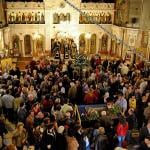
Intrinsic evil is a term which is often misunderstood as indicating something is essentially (and so absolutely) evil. The reason this is wrong is because evil is not natural, and so, has no real essence or substance of its own. Nothing can be essentially evil. There is nothing which is absolutely evil. Existence is good, which means, everything which exists, has some good in it because of its existence. Evil works to counter the good, to deny some proper good; it denies what is natural, seeking to undermine and destroy it. No one, no soul, can be said to be evil by nature, or to be absolutely evil. This is why, none of the desires of the soul can be said, in and of themselves, to be evil:
The desire of the soul is bad when one presupposes a wicked soul. But when I say that the soul itself has a desire, I am speaking of the desire that is essential to it. The one who makes use of this desire loves none of the wicked things but only the good ones, because he received both the appetitive faculty and the desire in order that he might pursue good things, in order that he might reach towards things that profit. Come then! If someone is greedy for wealth, he did not receive the desire of his own soul but the desire of greed. It is then a great thing to obtain the desire of the soul, when the word wicked is not adjoined to it. [1]
The problem lies not in with the desire, but how the desire is engaged, that is, how it is engaged in such a way we forget the greater, holistic good, which every good should participate in. When we desire something in an exaggerated fashion, become so attached to it, we desire it more than we should, and act on that desire, we deny ourselves the greater good from which that particular good is found, cut off the particular good from it, and so have it become less than it should be. The more we acted in this distorted fashion, the more we will deny the greater good, the more we will act against the natural good. The good which we desire, still remains good, in its proper context, but we do not engage it in a good way; rather, in a perverted fashion, so that our actions end up further away from the greater good each time we act in such a fashion. We have many ways which we can talk about such perversions, giving them names which sometimes appear as if they have some essence of their own, but in reality, they do not; we name them, however, so we can discuss the effects of our action, to have a convention we can readily use in order to point out the problem which we have created. But, we must always keep in mind, despite the conventions we create, we are not creating or discussing essences, but rather, the perversion and destruction of such essences. We must find a way to find the good which is being used and perverted and liberate it from the perversion so that we can return to nature and once again engage and embrace the holistic (and so greater) good:
Between persons, within a person, nothing is irretrievably evil. In every man, depraved as he may appear, there remains a good which it is always important to liberate and emphasize. It is the same with his desires. Underneath the strangest and sometimes the most fantastic desires and needs, a true need, a sometimes deep and absolutely vital desire is always hidden. This desire, more often than not, has not been emphasized and honored when it should have been. It was repressed, stifled. Now it is still waiting to be freed and perhaps even fulfilled.[2]
Evil, in the end, cannot last; it works as a parasite on that which is good, feeding off its goodness, its existence, slowly diminishing the good until the good itself is destroyed, including and especially its existence; then, as the evil has nothing left on which to feed, the evil itself vanishes as well, revealing its true character, that it is nothing in and of itself:
What, then, is the heart of the doctrine that the divine Apostle is teaching us in this passage? It is that at some point the nature of evil will be transformed into non-existence, completely made to disappear from reality, and pure divine goodness will contain all rational nature within itself; nothing of all that has come into being from God will fall outside the boundaries of God’s Kingdon, but when all the evil has been mingled with existing things has been consumed, like some material impurity, by the melting-process of purifying fire, everything will become just as it was when it had its origin from God—as it was when it had not yet come to share in evil.[3]
Everything was created good. Everything, so long as it exists, reveals it has not completely lost its goodness. Even inordinate desires, despite the way they have us do that which can be described as evil, have at their base some good which is being desired. To bring healing to the world, to bring healing to ourselves, all that is good must be freed from the evil which is living off of it, and healed from the harm which the evil has caused it. God does that in the eschaton, for in the eschaton, God is all in all, and all that is, participates in and experience God’s goodness in its own way. Evil, when detached from the good, will then destroy itself. How is it detached in this fashion? By Jesus, the God-man, who on the cross, and in his descent into hell, takes upon himself the sin of the world, all the evil which has been done throughout time, freeing the good which the evil had corrupted, and takes it to the abyss, where it is left to self-destruct. Thus, when we read that the Son submits to the Father, we must understand this, not as if the Son is somehow inferior to the Father in the divine nature, but rather, in relation to the work of the God-man on the cross, where the Son follows the divine plan to overcome evil and the death which it brings. We, then, are to follow after the Son, so as to allow the removal of evil from ourselves:
But submission to God is the utter removal of evil. When, then, all of us come to be outside of the realm of evil, its imitation of our “first-fruit,” then the whole mix that is nature, blended in with the first-fruit and becoming one body in its solidarity, will receiving within itself the rule of the Good alone; so, with the whole body of our nature mingled with the divine, immortal nature, that subjection here ascribed to the Son will become reality through us, as subjection is brought to fulfillment in his Body and is referred to him, who works in us the grace of submission.[4]
If evil were natural, if evil were “substantial,” this would not be possible; but as evil does not truly exist in and of itself, but only comes as the result of the perversion of some good, God can and does use the unnatural condition of evil itself against itself, have it consume itself, leaving creation free from its contamination. This is something which we can experience, in part, in time, but will be fully revealed to us in our entry in the eschaton, when the reality of creation will be fully revealed to all. God truly will be all in all, and all that is, will be good, sharing in the goodness of God, each in their own particular way (and in this way, all will be well).
[1] Didymus the Blind, Lectures on the Psalms. Trans. Jonathan Douglas Hicks (Downers Grove, IL: InterVarsity Press, 2024), 8.
[2] André Louf OSCO, Grace Can Do More. trans. Susan van Winkle (Kalamazoo, MI: Cistercian Publications, 2002), 90.
[3] St. Gregory of Nyssa, “On the ‘Final Subjection’ of Christ” in On Death and Eternal Life. Trans. Brian E. Daley (Yonkers, NY: St. Vladimir’s Seminary Press, 2022), 74.
[4] St. Gregory of Nyssa, “On the ‘Final Subjection’ of Christ,” 76.
Stay in touch! Like A Little Bit of Nothing on Facebook.
If you liked what you read, please consider sharing it with your friends and family!
N.B.: While I read comments to moderate them, I rarely respond to them. If I don’t respond to your comment directly, don’t assume I am unthankful for it. I appreciate it. But I want readers to feel free to ask questions, and hopefully, dialogue with each other. I have shared what I wanted to say, though some responses will get a brief reply by me, or, if I find it interesting and something I can engage fully, as the foundation for another post. I have had many posts inspired or improved upon thanks to my readers.













